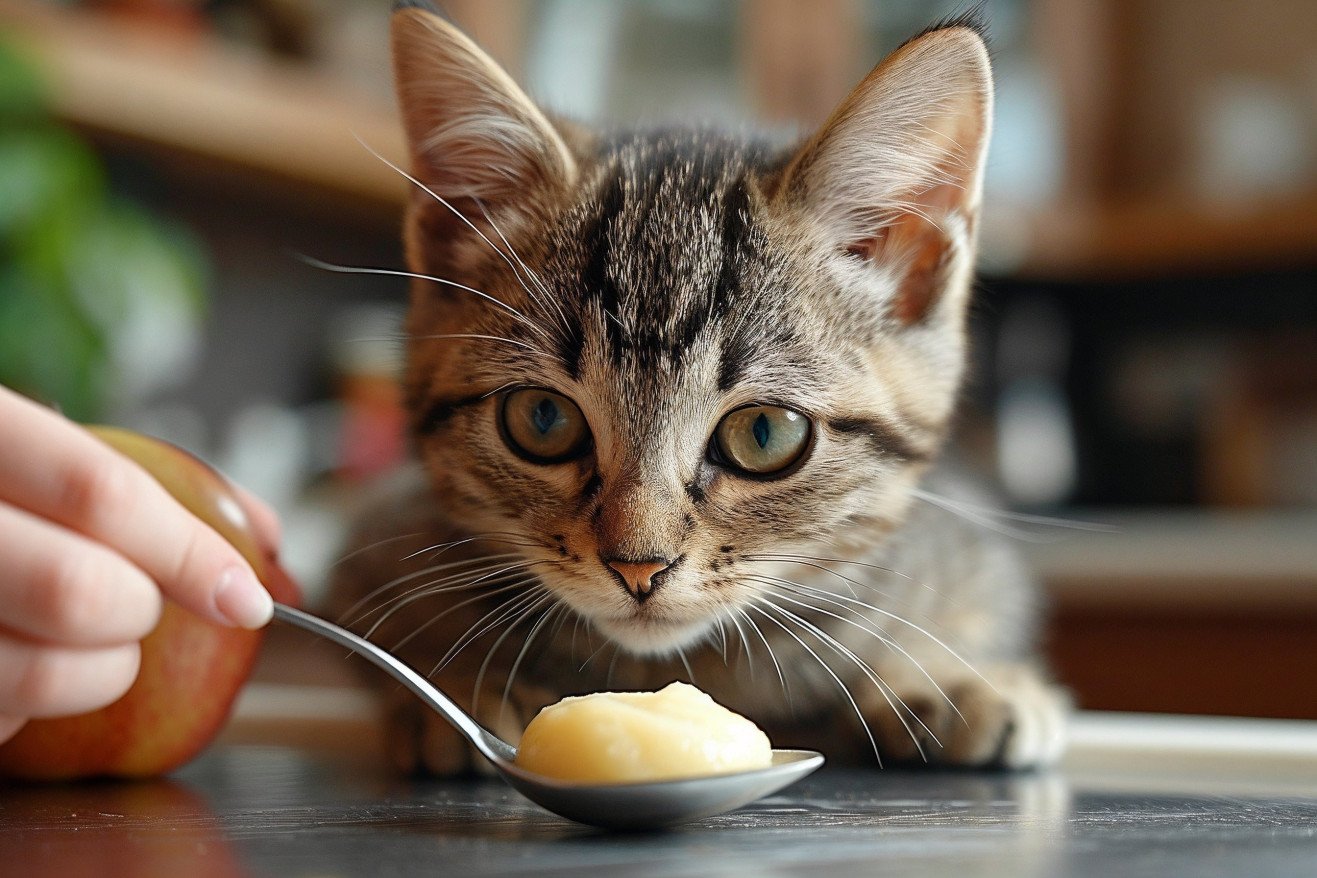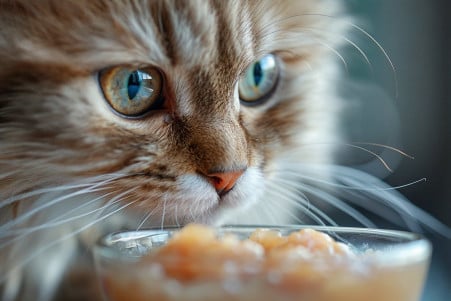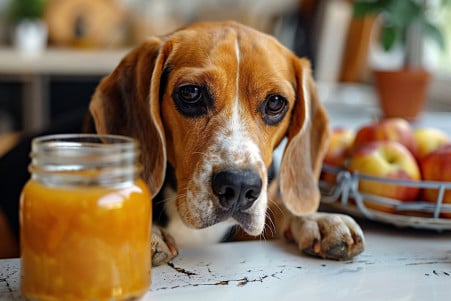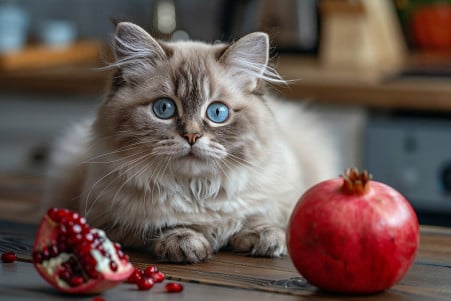Can Cats Eat Applesauce? Understanding the Feline Diet
8 February 2024 • Updated 7 February 2024

So, is that spoonful of applesauce you’re about to eat a good idea or a bad one for your cat’s diet? While cats can have a little bit of unsweetened applesauce, it’s not a good idea to give it to them regularly. This is because cats are obligate carnivores and because the sugar in applesauce can lead to a number of health problems.
In the sections below, we’ll review veterinary nutrition studies, including research on the cat’s specific nutritional requirements and the role of fruit in the feline diet. We’ll also look at research on feline digestion and the effects of sugars and sweeteners to determine the potential risks and rewards of feeding your cat applesauce.
This will help you better understand whether or not this human food can be an occasional part of your cat’s diet and ensure you’re making the most informed decisions about your cat’s health.
Can cats eat applesauce?
A Cat’s Nutritional Needs
As obligate carnivores, cats need a diet that is high in protein to be healthy, according to Purina. Animal-based proteins contain essential amino acids like taurine and arginine, which are important for a cat’s health. Cats also have specific nutritional needs, including preformed vitamin A, niacin, and arachidonic acid, which are found in animal tissues.
Cats eat very few non-meat items, such as fruits, in the wild. This is why cats require a diet high in animal proteins, according to Cornell University. While some fruits, like apples, may not be toxic in small amounts, they aren’t a part of a cat’s natural diet and don’t offer any nutrients that cats can’t get from a well-balanced diet that’s rich in animal proteins.
Cats can experience health problems if they stray from their typical diet. For example, cats that eat a lot of carbohydrates, which aren’t part of their natural diet, can become overweight or develop diabetes. This is important to keep in mind when thinking about the impact of sugars and sweeteners on cats.
The Sweet Misconception: Sugar, Sweeteners, and a Cat’s Taste
Cats, unlike humans and dogs, do not have a preference for sweet-tasting foods. This is because cats do not have the taste receptors for sweetness, according to Bond Vet. Cats have only 470 taste buds, and none of them are sensitive to sweet tastes, so they don’t have an innate attraction to sugar. While sugar is not toxic to cats, it is not part of their natural diet.
However, the potential health risks of sugar for cats should not be overlooked. Cats that consume sugar can become overweight, which is one of the most common nutritional disorders in cats, and they are at an increased risk of diabetes mellitus.
These concerns are detailed in the study "Cats and Carbohydrates: The Carnivore Fantasy?" by Myriam Hesta, which was published in PMC, which notes that high-carbohydrate diets, which often contain high levels of sugar, can be harmful to cats.
The risks of artificial sweeteners are even more serious. For example, xylitol, a sugar substitute found in many human foods, can be toxic to animals. According to the ASPCA, while xylitol is not as dangerous to cats as it is to dogs, it is still harmful, causing a rapid release of insulin and a subsequent drop in blood sugar, which can lead to liver failure.
To keep your cat safe, opt for treats that are safer and more in line with their nutritional needs, such as small pieces of cooked meat or specially formulated cat treats. These options will provide the satisfaction of a treat without the health risks associated with sugars and sweeteners.
How to Tell If Applesauce Is Safe for Cats
If you’re thinking about giving your cat applesauce, it’s important to pay close attention to the ingredients and quality of the product. While unsweetened applesauce is the closest to the kind of applesauce that would be safe for cats, it’s still not ideal.
If you’re going to give your cat applesauce, you should look for an all-natural applesauce that doesn’t have any preservatives or added sugars, as this will be the closest to the homemade applesauce that Catster recommends.
While applesauce can be safe for cats in small amounts and in the right circumstances, according to PetMD, it’s important to remember that portion control is key. They recommend that cats only be given one to two small pieces of apple, preferably cooked, once or twice a week to avoid any potential gastrointestinal issues that could be caused by the fiber in apples.
It’s also important for cat owners to be careful. According to Catster, cats should only be given applesauce that doesn’t contain preservatives like BHT and BHA and should never be given applesauce that contains artificial sweeteners. If you’re going to give your cat applesauce, you should only do so occasionally and after considering your cat’s health and dietary needs.
How Cats Digest Food
The cat digestive system is designed to support their role as obligate carnivores. Cats.com notes that the system includes the mouth, stomach, intestines, and accessory organs, all of which work together to help the cat absorb the nutrients they need. The entire process takes between 10 and 24 hours and starts in the mouth and ends with the cat eliminating waste.
While cats can digest some non-meat items, these are not necessary for their diet. When feeding cats non-traditional foods like applesauce, it’s important to know how dietary fiber impacts cats. Research published in the Journal of Animal Science found that dietary fiber, like cellulose, does impact the fecal composition and gut microbiota of cats, even though it’s not a major part of their natural diet.
In a summary of the proceedings from the 21st Annual ACVIM Forum, researchers noted that dietary fiber could have a number of potential benefits, including supporting gut health and reducing the frequency of hairballs.
However, it’s important to balance these benefits with the cat’s natural diet and nutritional needs. As a result, when thinking about feeding cats new foods like applesauce, it’s important to make sure that they’re introduced in a way that respects the cat’s digestive system and needs, as Royal Canin’s Vet Focus points out.
This includes starting with small amounts and watching for any signs of digestive upset, which can help prevent health problems while still allowing for some dietary exploration.
How to Tell If Your Cat Has a Food Allergy
Food allergies are a common concern for cats and can lead to a variety of symptoms, from itching and gastrointestinal issues to more serious problems.
While the Cornell University College of Veterinary Medicine notes that only a small percentage of cats have food allergies, the clinical signs, which include itching, skin lesions, and vomiting, can be very uncomfortable.
This makes it important to note that when you’re introducing new foods, like applesauce, to your cat, you need to be aware of the potential for food allergies, even though there are only a few documented cases of cats being allergic to apples.
If you think your cat may have an allergy, PetMD says that you should look for clinical signs like constant itching, scratching, or gastrointestinal problems. These issues can occur at any time, regardless of how long your cat has been on its current diet. In some cases, you may need to work with your vet to do a food trial with a novel or hydrolyzed diet to determine what your cat is allergic to.
It’s always important to talk to your vet before introducing new foods like applesauce to your cat’s diet to make sure that you’re not putting your pet at risk for a food allergy. Early detection and management of allergies are important for your cat’s overall health and well-being, and working with a vet will help you make the best and safest dietary choices for your cat.
So, Can Cats Eat Applesauce?
Applesauce can be part of a cat’s well-rounded diet if it’s given in moderation and free of sugar, preservatives, and spices. Based on the information from Catster and PetMD, it’s safe to say that the occasional spoonful of homemade applesauce is fine for cats, but it’s not necessary and doesn’t add much in the way of nutrition.
To ensure that cats can eat applesauce without any issues, pet parents should make sure to choose natural, preservative-free applesauce, avoid adding sweeteners, and make sure to limit the frequency and portion sizes to prevent stomach upset. It’s also important to remember that a cat’s diet should be primarily made up of a high-protein, meat-based diet, and not fruits and vegetables.
In summary, the most important thing to remember about feline nutrition is that cats need a balanced diet that meets their carnivorous needs, which is important for their overall health. If you’re ever in doubt or thinking about adding a new food to your cat’s diet, it’s best to consult with a vet to ensure that you’re feeding your cat in a way that will help them live a long, healthy life.


